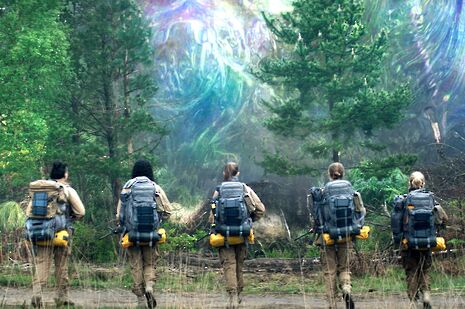Annihilation review: ‘to the lighthouse!’
Haunted and enchanted by Alex Garland’s sci-fi thriller, Lillian Crawford regrets its Netflix release

Human identity fascinates Alex Garland, and in his hands we come to challenge our very being. He ends his process of biological Annihilation on a question that haunts the soul. When we go outside and look around at the trees and the sky, everything seems different. It is a degree of unsettlement achieved by Denis Villeneuve in Arrival, and indeed by Garland’s last outing, Ex Machina. Rather than getting to the crux of the issue through artificial intelligence, here we take to nature via science-fiction at its absolute finest.
"The greatest threat remains the notion of losing one’s control over memory and action"
Unlike most works in the genre, the film refuses to overcomplicate and patronise the viewer with simplistic analogy (here’s looking at you, Christopher Nolan). The narrative itself is essentially ‘to the lighthouse!’, allowing for the dialogue to indulge in philosophical introspection. Anyone with a GCSE in physics can get their head round the concept of refraction at its core, creating the mesmerising “Shimmer” that encases much of the action. Just before Lena, a perfectly conflicted character for Natalie Portman, is torn from life into this paradisal hell, we watch her hands through the skewed lens of a glass of water, tainted by a drop of blood. At the climax, it will be pure once more.
Jeff VanderMeer’s novel has been deemed unfilmable since its publication, but the immense visual impact of the picture’s artistry soon dispels such fears. What is malignant is so often beautiful, the tension between aesthetic surface and hidden terror possessing the narrative as it strays from the determined path. As with their incredible work on films like Interstellar and Blade Runner 2049, Double Negative more than prove themselves as the most impressive visual effects company working today, crafting a quasi-danse macabre at the close to Ben Salisbury and Geoff Barrow’s melancholic score. The fight for self-identification displayed as fiction is one all too real for the viewer, made devastating in its painful repetition.
Annihilation has blockbuster elements aplenty, which perhaps caused Paramount’s criticism of over-complication for passive viewers. This was a film made for the cinema screen, more than warranting an IMAX release, and yet it has been condemned to laptops and televisions in the United Kingdom. It is a miracle that Garland salvaged his ending, but the Netflix release simply does not do justice to the achievements on display. Switch off the lights and become immersed in the action, allow the horrors to engulf the mind as its makers intended, or its power will dissipate.
The creature-creations are indeed terrifying, and Garland makes for a master of suspense. But while the things we see and hear are often nauseating to the levels of a man’s intestines squirming like eels, the greatest threat remains the notion of losing one’s control over memory and action. The film expands on Ex Machina’s Turing tests to an analysis of the cloning process, of watching the self being replicated in front of one’s eyes, and having to be the one to destroy it. By removing men from the central task force, femininity triumphs over masculinity, their maternity capable of perceiving creation where their predecessors only observed destruction.
Garland tackles diversity with an unflinching frankness too seldom seen in mainstream cinema. In its commitment to showing all people as equals regardless of race and sexuality, Annihilation transcends modern obsessions with screaming representation. Instead the film just gets on and does it, a message essential to the conveyance of the innately disparate mechanics of nature. It is complexity simplified, and when it looks as alluring as this, it becomes impossible not to be caught in Garland’s philosophical web
 News / Cambridge academics sign open letter criticising research funding changes22 February 2026
News / Cambridge academics sign open letter criticising research funding changes22 February 2026 News / Supporters protest potential vet school closure22 February 2026
News / Supporters protest potential vet school closure22 February 2026 News / University Council rescinds University Centre membership20 February 2026
News / University Council rescinds University Centre membership20 February 2026 News / Hundreds of Cambridge academics demand vote on fate of vet course20 February 2026
News / Hundreds of Cambridge academics demand vote on fate of vet course20 February 2026 Comment / A tongue-in-cheek petition for gowned exams at Cambridge 21 February 2026
Comment / A tongue-in-cheek petition for gowned exams at Cambridge 21 February 2026









